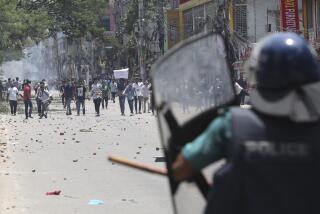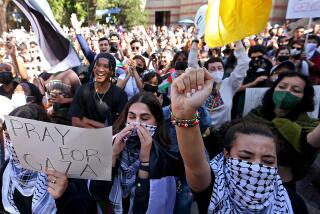Syria moves to halt spread of unrest into central Damascus
Reporting from Beirut — Security forces in the Syrian capital increased checkpoints, troop deployments and helicopter patrols Saturday in a bid to keep an overnight surge of antigovernment protests in the suburbs from spreading to the heart of Damascus, a crucial stronghold for President Bashar Assad.
The beefed-up deployments came as Iran, Syria’s closest ally, for the first time publicly pressed Assad’s government to accede to the “legitimate” demands of the Syrian public.
Damascus and the commercial city of Aleppo are key centers of support for Assad’s government. Large protests in either city would be seen as a sign that Syria’s better-off business people, regarded as still largely loyal to Assad, have turned against him. But at least one counter-rally by his supporters Saturday in a southern suburb of Damascus indicated that the president retains an unmeasured but significant amount of backing.
Across Syria, activists reported the killings of three people by security forces Saturday in a heavy night and day of protests against Assad’s government, which the United Nations accuses of killing at least 2,200 civilians since antigovernment protests began in March.
As night fell, Damascus residents said the capital was calm but security forces were out in noticeably greater numbers.
“There are extra checkpoints, and we hear helicopters every hour or so,” a 26-year-old student said, speaking anonymously because she feared retaliation by the government. People in Damascus “are trying to carry on as normal,” she said. “Maybe we are in denial. But the tension is palpable.”
Saturday was an Islamic holiday marking the receiving of the Koran by the prophet Muhammad. Protests erupted as crowds spilled out of mosques after prayers for the holiday.
Two people were killed Saturday when security forces opened fire on protesters in the port city of Latakia and in the city of Qusair, according to accounts of opposition coalitions that gather reports from members in Syria.
Saturday’s most dramatic protest centered on a mosque in Kafar Sousa, a suburb on the southern edge of old Damascus. The headquarters of a branch of the country’s secret police is in the same neighborhood.
After overnight prayer services, men in the mosque broke into chants opposing Assad’s regime, videos on the Internet showed.
Soon the protesters were shown wrenching shelves off the mosque walls to barricade the doors against security forces.
Outside the mosque, crowds of Assad supporters gathered. They began calling out slogans in scenes captured on cellphones and displayed on the Internet.
Family members and friends of the men trapped in the mosque also gathered outside. Some called for a march to a main Damascus square. Security services and troops opened fire with guns and tear gas, killing one person, activists reported.
Videos purportedly show small protests in Damascus on Saturday. One featured a chanting crowd of several dozen young men, led by patrols on wobbling bicycles, winding through a leafy neighborhood of homes and high garden walls. “We don’t want your reforms anymore,” the men chanted, dismissing Assad’s repeated promises to allow political parties and to ease his autocratic rule.
Protests also were reported in the Damascus suburbs of Arbaeen, Duma and Hajar Aswad.
Outside Syria, Assad’s crackdown was leaving the regime ever more isolated, with a rare, if limited, rebuke from Iran.
“The government should answer to the demands of its people, be it Syria, Yemen or other countries,” Iranian Foreign Minister Ali Akbar Salehi said, according to the Iranian Students News Agency. “The people of these nations have legitimate demands and the governments should reply to these demands as soon as possible.”
Salehi appeared to stand by Assad’s government, however.
“A vacuum in the Syrian regime would have an unpredictable impact for the region and its neighbors,” he said.
Knickmeyer is a special correspondent. Special correspondent Roula Hajjar in Beirut contributed to this report.
More to Read
Sign up for Essential California
The most important California stories and recommendations in your inbox every morning.
You may occasionally receive promotional content from the Los Angeles Times.










